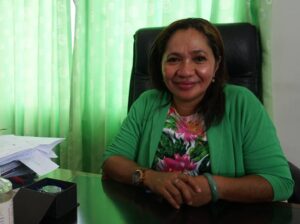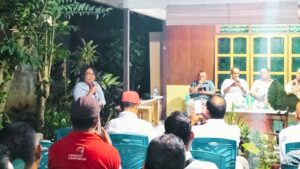A number of people dressed in black put their arms around Jeffry Wenda’s shoulders as they rushed him to the car. At that time, Tuesday afternoon, May 10, 2022, Jeffry — the spokesperson for the Papuan People’s Petition (PRP) was arrested from a house in Perumnas IV residential area in Jayapura City, Papua, along with 6 other people. The arrests were made after Jeffry staged a demonstration against the formation of a New Autonomous Region (DOB) a.k.a regional expansion, and urged the revocation of Special Autonomy (Otsus) in Papua. They were only released on the evening of May 11 or the day after their arrest.
“Masses of action, apart from me, have often received repression, beatings, and so on. Personally, I’m the most terrorized,” explained Jeffry when contacted by Jaring.id on Monday, October 31, 2022.
This arrest was not the first time for Jeffry. Previously, he was detained by the police twice for mobilizing mass movements, both in Papua and outside the island. In his latest arrest, Jeffry was accused of violating the Electronic Information and Transactions Law for uploading a conversation with a police officer at the Jayapura Police.
“Before the demonstration, I submitted a notification letter to the Jayapura City Police. That evening, I received a call from the Jayapura Police Intelligence and Security Service. Then, I uploaded the conversation to Facebook. After that, I was arrested under the Electronic Information and Transactions Law for defamation,” he said.
Jeffry’s demonstration is a series of rejections of the government’s decision to establish three new provinces in Papua, namely South Papua, Central Papua, and Central Highlands Papua. Not only Jayapura, rallies were also held in Wamena, Paniai, Yahukimo, Timika, Lanny Jaya, and Nabire.
More than 700 thousand people and hundreds of organizations who are members of the PRP rejected the ratification of the bill. They think that special autonomy is not the answer to the problems in Papua. Jeffry said the policy did not accommodate the interests of the Papuan people. “We are aware that the state has indeed carried out a form of colonialism since the 1960s. And this special autonomy is a legal product that seeks to bind the Papuan people to simply being part of the Unitary State of the Republic of Indonesia,” he said.
Previously, on October 15, President Joko Widodo passed Government Regulation No. 106/2021. This derivative legal product is based on Law No. 2/2021 on Special Autonomy for Papua. One of the issues contained in this regulation is the opening of opportunities for indigenous Papuans (OAP) to sit as members of the Papuan People’s Representative Council (DPRP) and the Regency/City People’s Representative Council (DPRK).
The explanation regarding indigenous Papuans is contained in Article 1 point 24. “Indigenous Papuans, hereinafter abbreviated as OAP, are people who come from the Melanesian racial group consisting of indigenous tribes in the Papua Province and/or people who are accepted and recognized as OAP by the Papuan customs community.”
The formation of these three new provinces is considered to have ignored the rules contained in Article 77 of the Papua Special Autonomy Law. It was stated that the expansion of the territory should obtain consideration and approval from the Papuan People’s Assembly (MRP). The level of population density is also considered not to meet the expansion requirements.
Secretary General of the Papuan Customary Council (DAP), Leonard Imbiri, suggested that the government review the plan for regional expansion in Papua. According to him, the division of districts that have been carried out so far has not had a significant impact on indigenous Papuans.
The results of the legislative elections for the Papua and West Papua Regency/City Legislative Council in 2019, he said, were evidence of how their citizens were not only excluded from an economic perspective but also politically. The percentage of OAP who can occupy parliament is not much. “I saw that in the last year’s election, the orientation was more in favor of the interests of individuals, parties, and power,” said Leonard on Monday, October 3, 2022.
He was not surprised that there were still many violations of human rights, development injustice, and the fulfillment of other basic life rights that have not been fulfilled in Papua. “Because those who are elected are those who sit as members of the legislature, they will also participate in making development policies, so elections that prioritize individual interests tend to bring chaos,” he said.
Based on data from the Regional Autonomy Advisory Council (DPOD) of the Ministry of Home Affairs, the representation of OAP in parliamentary seats is still small. Although the percentage of OAP occupying parliamentary seats in Jayapura City is relatively high, reaching 56%, in other areas such as Keerom and Sorong City, the percentage is only 20%. On average, there is at least 38 percent of OAP occupy legislative seats in Papua and 36 percent in West Papua. Therefore, the aspirations and needs of the indigenous Papuan people still cannot be accommodated properly.
Deputy Chairperson of the Papuan People’s Representative Council (DPRP), Yunus Wonda in the DPRP’s official public relations release regarding the 2019 Election, had expressed his concern about the number of OAP representatives in the regency/city legislative council. “I predict that with this condition, OAP representation in the following period will no longer exist. There will be no native Papuans who become members of the regency/city legislative council,” he explained on November 6 three years ago. “However, the identity of the indigenous Papuans remains in their own land,” he continued.
The Rising Number of Electoral Districts
The number of seats in the House of Representatives and electoral districts in the 2024 General Election will increase along with the formation of three new autonomous regions. Referring to the Election Law, the number of seats for the House members is set at 575 seats. These hundreds of seats are contested by 80 electoral districts, each of which can consist of three or a maximum of 10 seats. The General Election Commission (KPU) has several months, at least until early February 2023, to determine the number of seats and electoral districts. This is in accordance with KPU Regulation Number 3 of 2022 concerning the Stages and Schedule of the 2024 General Election. This means that there are still about three months before the stages start running.
Heroik Mutaqin Pratama, a researcher for the Association for Elections and Democracy (Perludem) said the division of regions in eastern Indonesia must be accompanied by a legal framework related to the addition of electoral districts and seats from the new autonomous regions. The formulation of these regulations must be oriented to the principles of electoral district formation, Among the principles are that the electoral district needs to pay attention to regional unity and population equality, considers community interests and pays attention to the similarity of social conditions of the people in one electoral district.
“These principles should be a guide for the formation of electoral districts. In Indonesia, the KPU’s work is actually regulated by Law Number 18 of 2018, which stipulates seven principles,” said Heroik on Monday, August 22, 2022.
Meanwhile, Article 185 of the Election Law states that the preparation of electoral districts for members of the House of Representatives, Provincial Legislative Council, and Regency or Municipal Legislative Council takes into account the principles of equality of vote values, adherence to the proportional electoral system, proportionality, regional integrality, being in the same area coverage, and cohesiveness.
Heroik warned the election organizers to pay more attention to these principles in determining the electoral districts. He said the previous election problems should not happen again in 2024. One of the problems, he said, is the bypassing of electoral districts. “The bypassing of electoral districts can affect many things, one of which is the formulation of policies,” he said.
“For example, in the case of Bogor and Cianjur city, if the Cianjur electoral district is bypassed, how will the voices of the people in Cianjur be represented by those in Bogor? This will certainly have a huge impact on every decision-making in policy formulation,” he continued.
According to him, the bypassing of the electoral districts violates the principle of regional integrity. This resulted in the community not having a representative. Policy determination is ultimately not based on the needs of the community. People who experience their electoral districts being bypassed, he said, were often neglected because many legislative candidates only make visits or hear opinions to areas that have a greater chance to win. This issue is believed to have negative impacts if it continues to be ignored.
The Syndicate for Elections and Democracy (SPD) assesses that the electoral electoral method used by the KPU is currently inconsistent and unmeasured. Based on SPD records in the 2014 to 2019 elections, there were at least 45 electoral districts scattered throughout Indonesia. In 2014 at least 16 regions experienced a bypass in electoral districts. This figure even increased to 29 regions in the 2019 election.
Betty Epsilon Idroos, a Commissioner of the KPU, stated that the formation of electoral districts has adhered to the principles stated in the law. “Of course, we implement the law,” said Betty when Jaring.id met her in her office on Tuesday, September 13, 2022.
Fransiskus Letsoin, Head of the Technical Division of the Papua Province KPU, explained that the number of residents will determine the electoral district. “One of them is based on the data on the number of residents issued by the Ministry of Home Affairs,” explained Frans on Friday, September 23, 2022.
“The division of the population by seats in each sub-district cannot be less than three and cannot be more than twelve,” he continued.
In this determination, according to him, the KPU is guided by seven principles for the formation of electoral districts. “In order to get representation in line with the seven principles that the KPU adheres to, there is the principle of cohesiveness related to the representation of minority groups,” said Fransiskus.
In the election, there are at least two approaches to determining the number of seats. The first is to use an approach based on the minimum number of seats in one electoral district so that the seats in the Papua electoral district, which previously amounted to 10 seats, are changed into 12 seats. These 12 seats are divided into four electoral districts.
While the second approach is based on proportionality, which is adjusted based on the population. Referring to this approach, it is possible that there will be electoral districts with more than three seats because they are adjusted to the representation of the population.
Even so, Fransiskus said he was also aware that the representation of indigenous peoples in each election in Papua is still minimal. “KPU always encourages indigenous peoples to participate in elections, but this is also the work for political parties on how they determine their candidates,” said Fransiskus.
The National Democratic Party (Nasdem), the party that had the highest percentage of votes in Papua in 2019, confirmed that its party was very prudent in choosing candidates. In this case, according to the Head of Media and Public Communication of the Nasdem Party, Charles Meikyansah, all legislative candidates have the same opportunity. “In Nasdem, we are egalitarian. Everyone is the same, that’s why we also use the term “sister or brother” to call them because our position is the same. We also continue to encourage anyone to participate,” explained Charles on Thursday, October 13, 2022.
Mabruri, the Head of Public Relations of the Central Board of the Social Justice Party (PKS), stated that his party did not have specific criteria for determining candidates. “We do not look at the ethnic origin. The most important thing is that if they perform well and they are willing to be the candidates, there is no coercion. Of course, PKS will be very supportive,” said Mabruri on October 13, 2022.
Khoirunnisa Nur Agustyati, Executive Director of Perludem suggested the use of information technology in determining the electoral district in the upcoming elections. “So far, the formation of electoral districts is considered a very technical matter for the KPU, even though this is a liaison between us and our representatives,” explained Khoirunnisa after the ERA launch event in Jakarta.
At the end of last July, Perludem together with the Institute for Democracy and Electoral Assistance (IDEA) launched the Electoral Redistricting App (ERA). “Through this application, we hope that the public will be able to know what an electoral district is and how it performs,” said Ninis, as she is fondly called.
“We have done the outreach, and the response of KPU and the Bawaslu (Election Supervisory Body) was good in general. However, since it is a global app, it uses English. And it raises questions from the officers of KPUD (election organizers in regions) whether this app can be used in the Indonesian language because the officers prefer using Indonesian-language apps, and they are the ones who conduct the electoral district formation process,” she said on November 1, 2022. “But it seems that the KPU wants to develop its own application called Sidapil,” she said when asked about cooperation with the KPU.
Although not yet being used in Indonesia, the ERA allows the public to participate in counting and determining electoral districts. The ERA application can encourage the process of forming electoral districts that are much more transparent, accessible, and participatory. Ninis said, one of the advantages of the ERA application is the parliamentary seat feature that can help the amount of seat allocation.
The arrangement of electoral districts is very crucial because otherwise, it will have an impact on the winning of political parties in certain regions, especially in new regions, Ninis said, when asked about how important it is to reorganize electoral districts. “Perludem is currently conducting a judicial review to the Constitutional Court regarding the determination of electoral districts. One of the things we highlight in the Constitutional Court in Law 17 of 2017 on elections was the principle of forming electoral districts,” she explained on Tuesday, November 1, 2022.
According to Ninis, the number of seats is already permanent, so even if there is a change in the area such as division, the number of seats cannot be changed because it is already regulated in the law. “An electoral district is not just a competition arena. It has been determined, and once it becomes public, it is taken for granted without the public being aware if it really represents their interests,” she added.
Ninis explained that the arrangement of electoral districts often creates polemics because it will affect the calculations of political parties. “This needs to be reorganized, not only the electoral districts, but also in the allocation of seats. Political parties have their own calculations, and the reluctance to reorganize (the bypassed electoral districts) is suspected to have an effect on the election results,” she said. Ninis believes that if the bypass of constituency continues, it will increase the potential for gerrymandering practices in Indonesia.
Victory Before The Election
Yuko Kasuya, professor of political science at Keio University, Japan, stated that the term gerrymandering was not widely heard in Indonesia. This is because this fraudulent practice to benefit one party is mostly used in electoral college electoral systems such as in the United States. He gave an example of how in 1812, Elbridge Gerry as Governor of Massachusetts proposed changing the electoral district by combining areas with urban and rural characteristics into a single unit. This then changed the constituency in the Boston area. According to Yuko, the formation of this electoral district was deliberately made to win the Senate seat for the party that once existed in America, namely the Democratic-Republican Party.
Even so, a similar threat still haunts Indonesia, especially in areas undergoing expansion. “Gerrymandering refers to drawing electoral boundaries to favor one party or political group over another. Malapportionment means unequal seat allocation across regions, provinces, or prefectures,” Yuko explained on Monday, September 24, 2022.
In his paper “An Evaluation of the 2016 Recommendation of the Parliamentary and State Assembly Delimitation for the State of Selangor: A Comparative Perspective”, Yuko explains that the practice of gerrymandering is in many ways contrary to democracy.
In Indonesia, the practice of winning before elections is still a rumor, but in Malaysia, the winning of political actors lasts for decades. The non-transparent formation of electoral districts has prompted the Malaysian Election Reform Committee to demand the electoral districts be arranged by an independent body and not an election commission. Suspicions of winning and the buying and selling of votes in the elections became one of the reasons behind the protests of tens of thousands of demonstrators to the streets.
Danesh Chacko, Director of Action Malaysia, an advocacy organization for electoral reform in Malaysia, explained that the practice of gerrymandering in Malaysia occurs because of the dominance of racial issues. “In the past, a political actor could win an electoral district even before the election was held. The issue of electoral transparency often raises suspicion, because this determination is decided by the election commission which is suspected to have a strong affiliation with the dominant party,” explained Danesh via video call.
Malaysia’s electoral reforms began to sound loud when the victory of the opposition Pakatan Harapan coalition reverberated in 2018. But in practice, pushing for reform is certainly not that easy, vote deception continues. Even though there is Suruhanjaya Choice Raya (SPR) or an independent institution that recommends electoral districts, their existence is still in doubt. The reason is that SPR is often accused of being partisan by the community.
“Today, the situation may look better, but we continue to oversee the election process which is still often thwarted,” he continued.
Similar unrest also hit Timor Leste. Despite having quite different issues, the victory of certain political actors before the election was predictable from a long time ago.
Timor Leste, which just held a vote in March 2022, already has a new President, namely Jose Ramos Horta. Horta’s victory was almost evenly distributed across 13 districts in Timor Leste. In this election, Horta eliminated at least 15 other candidates – the largest number of candidates since Timor Leste held elections in 2002.
Based on the release of The Asian Network for Free Election (Anfrel), the Timor Leste election is considered peaceful and transparent. The enthusiasm of the residents was evident in every polling station. More than 70 percent of citizens exercise their right to vote out of a total of 859,613 names on the voter list.
In Timor Leste, the electoral system uses a close list method in which the public only chooses parties. If the party wins, then that party will determine the people who will sit in parliament. Virgilio Lamukan, one of the participants in the East Timor election, explained that not a few people are still trapped by the romanticism of heroism. Therefore, the victory of political actors who have served in the past can almost always be guaranteed.
“People in Timor Leste tend to choose political actors who have played a role in the history of independence, so their interest in these actors is more than new people,” said Virgilio, Saturday, September 29, 2022. This condition was not favorable enough for new election contestants.
According to Virgilio, transparency in determining politicians in Timor Leste’s parliament is as bad as in Malaysia. People never know how the performance of each person in parliament. He said the principle of determining the electorate and public representation in elections has never been monitored. The interests of power often sacrifice the lives of many people.







